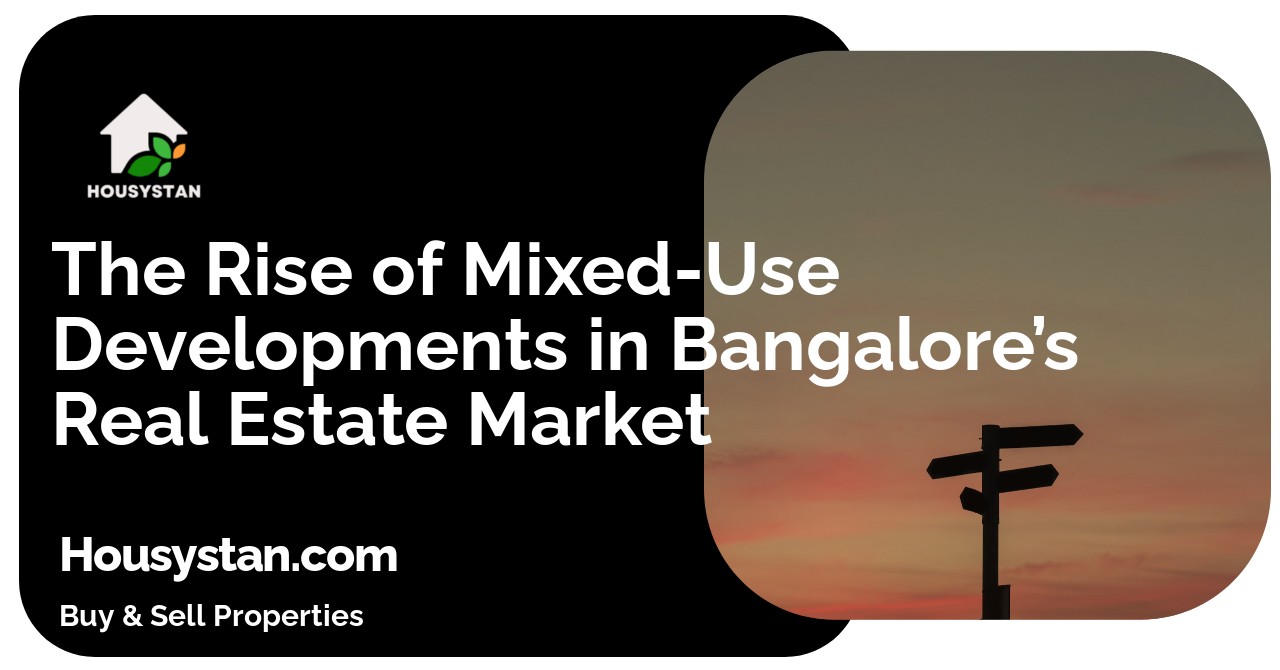The Rise of Mixed-Use Developments in Bangalore’s Real Estate Market
Read latest blogs and articles from Housystan

The Information mentioned here was last updated on:
21/2/2026The Rise of Mixed-Use Developments in Bangalore’s Real Estate Market
Introduction: A New Face of Urban Living in Bangalore
Bangalore, long celebrated as India’s technology capital, is witnessing a remarkable transformation in its real estate landscape. The city’s aspirations for a modern, integrated lifestyle are fueling the rise of mixed-use developments—urban spaces where residential, commercial, retail, and recreational facilities coexist harmoniously. The trend is redefining how people live, work, and socialize, and is quickly becoming the cornerstone of Bangalore’s urban planning and real estate growth.
- Verified Tenants/Buyers
- Unlimited Property Listing
- Zero subscription/charges fee
Understanding Mixed-Use Developments: The Concept Unveiled
Mixed-use developments—often referred to as integrated townships or urban enclaves—combine multiple property uses within a single, self-sustained space. These projects typically blend residential apartments, office spaces, shopping centers, restaurants, entertainment zones, and sometimes even schools or healthcare facilities. The overarching goal is to create vibrant, walkable communities that minimize travel time and foster a holistic urban lifestyle.
Factors Driving the Popularity of Mixed-Use Projects in Bangalore
Bangalore’s rapid urbanization, burgeoning population, and shifting lifestyle preferences are at the heart of the mixed-use trend. Here are some key factors contributing to their popularity:
1. Urban Congestion and Time Constraints
With traffic congestion being a perennial issue in Bangalore, mixed-use spaces offer residents and professionals the luxury of proximity. The ability to live, work, and shop within the same precinct drastically cuts down commute times, allowing for a better work-life balance and more leisure time.
2. Growing Demand for Lifestyle Amenities
Modern homebuyers and tenants seek more than just a place to live—they look for amenities that support their aspirations. Mixed-use developments cater to this demand by offering gyms, swimming pools, landscaped gardens, retail outlets, cafes, and entertainment hubs, all within arm’s reach.
3. Evolving Work Culture and Flexibility
The rise of remote work and hybrid office models has blurred the lines between home and workplace. Mixed-use projects, with their co-working spaces and proximity to business centers, are perfectly aligned with this new paradigm, making them highly attractive for tech professionals and entrepreneurs alike.
4. Sustainable Urban Design
Integrated townships promote sustainable living through efficient land use, energy-saving infrastructure, and reduced dependence on private vehicles. Walkability, green spaces, and smart resource management are becoming non-negotiable features for environmentally conscious buyers and renters.
Key Locations in Bangalore Embracing the Trend
Several neighborhoods in Bangalore have emerged as hotspots for mixed-use development. Prominent examples include Whitefield, Sarjapur Road, Hebbal, Devanahalli, and Electronic City. These areas, once peripheral, have transformed into thriving urban centers, hosting landmark projects designed by top real estate developers.
Whitefield: The Pioneer of Integrated Living
Whitefield, once a quiet suburb, now boasts a dynamic mix of IT parks, luxury residential complexes, shopping malls, and entertainment venues. The area’s robust infrastructure and cosmopolitan vibe make it a preferred destination for both homebuyers and corporate tenants.
Sarjapur Road: The Emerging Mixed-Use Corridor
Sarjapur Road, strategically located with easy access to major IT hubs, is rapidly evolving as a mixed-use corridor. The blend of residential towers, commercial spaces, international schools, and healthcare centers is attracting young professionals and families seeking a balanced lifestyle.
Benefits for Investors and End-Users
The surge in mixed-use developments is not just a boon for urban dwellers; it is also catching the eye of investors. Here’s why:
1. Enhanced Property Value
Properties in integrated developments tend to appreciate faster, thanks to superior infrastructure, amenities, and sustained demand. Rental yields are also higher, given the steady influx of working professionals and families.
2. Diversified Revenue Streams
For developers and investors, mixed-use projects mitigate risk by offering multiple revenue streams—residential leases, commercial rents, and retail profits. This diversified approach is more resilient to market fluctuations than single-use projects.
3. Future-Proof Investments
With evolving urban lifestyles and changing work patterns, mixed-use properties are better positioned to adapt to market shifts, ensuring long-term viability and demand.
Challenges and Considerations
Despite their many advantages, mixed-use developments also present unique challenges. These include the complexity of planning and executing multi-functional spaces, managing diverse tenant needs, and ensuring seamless connectivity between different components. Regulatory approvals and compliance with zoning laws can also be intricate. However, leading developers in Bangalore are working closely with urban planners and municipal authorities to overcome these hurdles and deliver world-class projects.
The Future of Bangalore’s Real Estate: Integrated Living as the New Norm
The momentum behind mixed-use developments is only expected to intensify in the coming years. As Bangalore continues to grow as a global tech powerhouse, the demand for integrated, convenient, and sustainable urban environments will remain high. Real estate developers are investing heavily in smart technologies, green building practices, and community-centric designs to stay ahead of the curve.
Conclusion: A Paradigm Shift in Urban Living
The rise of mixed-use developments is reshaping Bangalore’s real estate market, ushering in a new era of urban living. By thoughtfully combining residential, commercial, and recreational spaces, these projects are setting new benchmarks for convenience, sustainability, and lifestyle. For residents, investors, and the city itself, mixed-use developments represent a win-win proposition—offering an integrated way of life that meets the needs of today while anticipating the aspirations of tomorrow.